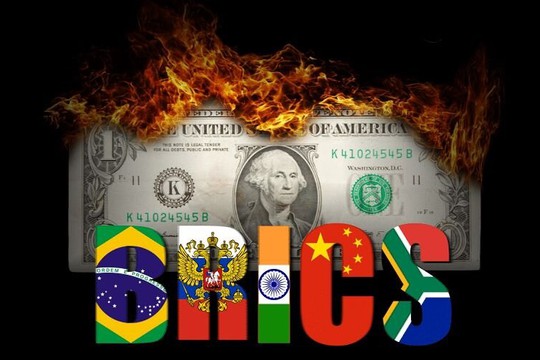Pic.: The Asia Times
The next Trump administration might end up boosting prospects of a BRICS currency in his roughshod attempt to reassert American primacy. A ham-fisted approach to bilateral relations with major rising powers, meanwhile, will likely only strengthen their resolve to band together and collectively undermine any US-led global order, writes ‘The Asia Times’.
Not only India but other non-Western powers such Indonesia, Turkey, Malaysia and Saudi Arabia will also likely not only join the BRICS but also more actively contribute to new “de-dollarization” initiatives.
In recent years, America has tried to solicit international support and has been gradually building a new coalition to “de-risk” from China, particularly in high-tech items such as high-end semiconductors and the equipment used to make them.
But Trump’s likely unilateralist policies, including high blanket tariffs, could encourage rising powers, especially those in BRICS, to double down on efforts to “de-risk” from the US, paving the way for a new global order altogether.
To be sure, de-dollarization is complicated and largely still aspirational. For instance, India has struggled to effectuate its more narrow, bilateral non-dollar-denominated trade with key partners such as Russia.
Amid a historic boom in India’s import of heavily discounted Russian oil, Moscow is accumulating US$1 billion every month that it struggles to use due to both Western sanctions and India’s capital control measures.
Leading Russia experts have warned that Russia’s mass of “frozen funds” will likely “reach tens of billions of dollars,” and that the “situation is aggravated by India’s historically high aggregate trade deficit, which reduces the possibilities of clearing settlements with third countries.”
In the past, similar problems also emerged amid a boom in non-dollar-denominated trade between Iran, another BRICS member that is also heavily sanctioned by the West, and major oil customers such as India and China.
Nevertheless, the world’s most populous nation continues to maintain robust ties with Russia, a major source of armaments and hydrocarbon goods throughout the past decades.
Indian private refiner Reliance (RELI.NS) secured a massive deal with Russia’s state oil firm Rosneft (ROSN.MM). The 10-year agreement, amounting to a whopping 0.5% of the entire global supply, is worth roughly $13 billion a year.
The new deal notably accounts for roughly half of Rosneft’s seaborne oil exports, making Indian markets a leading customer.
Eager to maintain American primacy, Trump warned over his social media platform (Truth Social) that partner nations could “face 100 per cent tariffs, and should expect to say goodbye to selling into the wonderful US economy” unless they commit to “neither create a new BRICS currency, nor back any other currency to replace the mighty US Dollar.”
Harkening back to his “Make America Great Again” foreign policy mantra, the incoming US president warned any backers of a BRICS currency: “They can go find another ‘sucker.’ There is no chance that the BRICS will replace the US dollar in international trade, and any country that tries should wave goodbye to America.”
“Whenever the West bashes us, we gain credibility in Moscow,” an informed source in New Delhi told this writer, underscoring India’s preference to play the superpowers off one another while maintaining simultaneous strong ties with both Washington and Moscow.
Given India’s economic momentum and its emerging centrality to global growth, it’s foreign policy leanings will be instrumental to any global de-dollarization drive.
Currently, the US dollar accounts for more than half of the world’s trade invoices and more than 80% of all international currency transactions. However, Trump’s policies could inadvertently contribute to the gradual decline of US dollar use in coming years.
On the one hand, it remains to be seen how the next US administration will deal with outstanding bilateral issues with friendly BRICS members such as India.
Malaysian Prime Minister Anwar Ibrahim has welcomed the end of an American-led unipolar world and, accordingly, has pivoted to the BRICS and China, which he has described as a springboard for the creation of a more multipolar order.
For his part, Indonesia’s new president, Prabowo Subianto, has reversed his predecessor Joko Widodo’s policy by actively seeking membership in the BRICS. By joining the bloc, these new rising powers seek to bolster ties with Beijing, a major investor and trade partner, as well as express certain discontent with the US-led order.
read more in our Telegram-channel https://t.me/The_International_Affairs

 12:08 28.12.2024 •
12:08 28.12.2024 •























